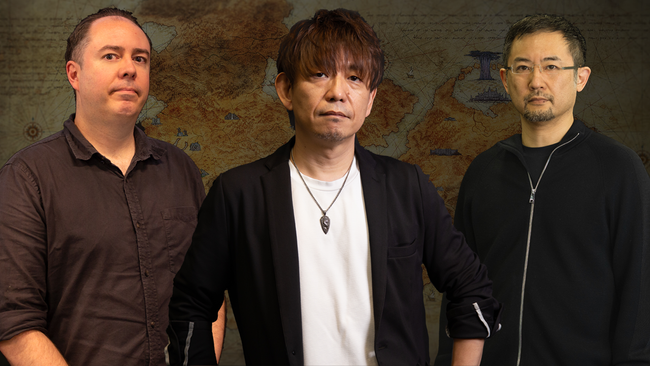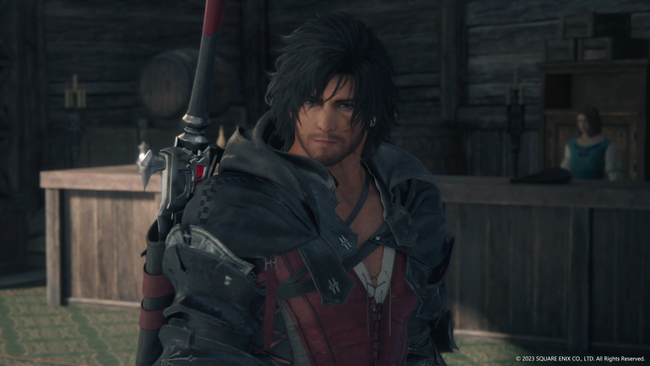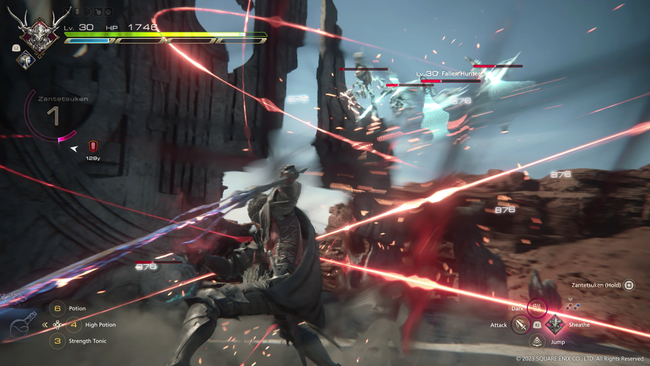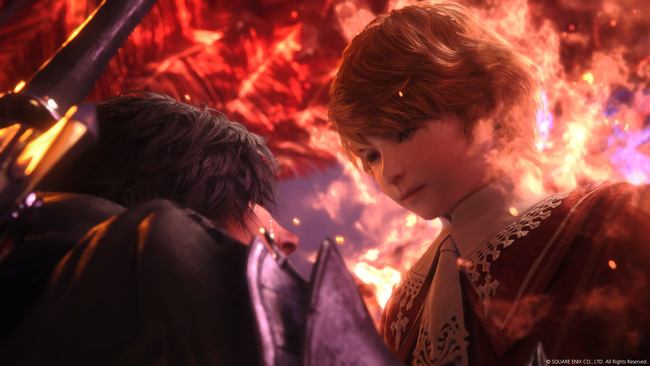
“We have a dream team on 16” - Final Fantasy XVI Developer Interview
Even when you do this job for quite a long time, it’s rare that you get such a strong sense of continuity with a single developer. I feel quite lucky to have that with Naoki Yoshida, producer of Final Fantasy XVI, however.
In my preparation for a meeting with the legendary boss of FF14 to talk about his team’s latest game, I reread the transcript of our first meeting - almost twelve years prior, when he first took over Square’s beleaguered MMO and embarked on a worldwide apology tour. RPG Site was one of the outlets Yoshida spoke to back then, when he was a relative unknown promising to work a miracle on a truly broken game.
Fast forward to 2023, and he’s in the big chair: producing the latest main-line Final Fantasy, backed by a team of veterans from across the company. Two of those veterans - art director Hiroshi Minagawa, and localization boss Michael Christopher Koji Fox, flanked Yoshida in the interview room. The discussion touches on fan expectation, hopes, fears, what sets FF16 apart - and plans for the future.
Here’s the chat in full. The conversation has been edited for clarity.

RPG Site: Just while I set up, I just want to say -- I’m really impressed by how you’ve tried to thread the needle between Final Fantasy and something new. It’s a big swing to take!
Naoki Yoshida: I mean, I've been working with you for so long on coverage for FF14, so we've been really, really interested to see how you responded to FF16 - so that's great to hear.
RPG Site: Well, y'know, on that topic - I went back to our first interview - which was over 11 years ago now...! What's really impressive is that in that interview we talked about what you would want to make if you made a single player Final Fantasy game. This was right as you started on FF14.
And you said... "If I do work on a single player game, there'll still be an essence that you can compete with others. Through a ladder system, maybe." And you've done exactly that, haven't you, with the challenge stuff, which has online leaderboards? You said it 11 years ago; you did it!
Yoshida: Phew! I'm glad I said that... I'm glad that I followed through! [laughs]
RPG Site: So today, a big part of it is seeing RPG stuff. We have a saying among our staff, which is 'everything is an RPG these days'. Even right now - I previewed Street Fighter 6, and the single-player there is a full-on RPG. Zelda is more RPG-ish than it's ever been. There's Star Wars Jedi Survivor recently.
You meanwhile have Final Fantasy, which is very traditionally an RPG, and you're moving it towards action. So it's like you've got those games coming from the action axis and becoming more RPG, and you're going the other way from RPG towards action... and you're sort of meeting in the middle. So how do you make sure that you don't end up lost in that muddle? How do you stand out in that space?
Yoshida: It's interesting, but I think that everyone is kind of aiming for the same sort of things. So you have these very classic hardcore games that are like 'okay, we need to make ourselves a little more modern, we need to bring in those action elements. Then you have those action games that are like, 'yeah, but people really like these RPG elements, so we kind of need to go this way...' And so everyone's kind of like - there's this window of that perfect blend that everyone's aiming for.
I think what sets Final Fantasy XVI apart is that we focused... Again, while we're moving to action and we put a lot of effort into creating action, it's got to be about the story. Final Fantasy is about the story. We put our main focus, even more than action, on that story. And you look back at the previous games, at FF15 - they had their story, but it wasn't complete. And then they try to make it complete, and then they promise some more story, but then they don't give us the story...
And so you had a lot of people that went into the series wanting us to give them a great story, and they didn't get that. And a lot of people were disappointed in that. Like, even if they liked the game, they're left wanting because one of those main pillars of the Final Fantasy series, stories, was not given to them. And so we wanted to make sure that we had our first and foremost focus on the story and we think that is going to set us apart from all those other games out there. In those games, yes you're going to have action, you can have those RPG elements... But are they going to have a story that is as engaging as FF16's story? I think that's what sets it apart.
RPG Site: And that really brings me on to Minagawa-san, because you can't really tell a story like this without the art being right for it. When I came in I said about threading the needle - and it feels to me like art is one of the areas where that is most acute? It maintains that sort of Final Fantasy, Japanese vibe, but it's definitely got a tinge towards Western fantasy worlds too. How long did it take you in the process to find that balance?
Hiroshi Minagawa: It probably comes from in my experience, having worked on FF12 and FF14, and also having a team that worked on those same projects is that we were just creating something that felt right to us. Because of that, we had a very good foundation that we could build upon. But on top of that, I think there were two things that we found the most challenging - and that we thought that, you know, was really important to this and that we wanted to challenge ourselves with.
First was creating very realistic characters with a very realistic facial motion - and being able to have all these different expressions and tell a story through those facial emotions. It was challenging us to create something that's very, very natural. Another thing was lighting. A lot of our staff wasn't ready for this, and so we had to learn on the fly. And we learned a lot with this because we put a lot of effort into creating something that's going to be spectacular.
Yoshida: I mean, if you look at the core members and and not just like the leads but also the people that are working underneath, you've got pretty much everybody worked on the FFT, everyone who worked on FF12, FF14 - and so you have these people that love those types of games and created those types of games, they were all coming together and the result is that we have a dream team on FF16.
Minagawa: For the cutscene team lead we have Takeo Suzuki, alongside others coming directly from FF12.

RPG Site: Koji, this one's actually more or less for you. So, I would say you are now arguably the most significant non-Japanese contributor to Final Fantasy since Nasir*, right? And, you know, that's not a bad person to be behind, as the series probably wouldn't exist without him. So how does that feel? Do you feel the pressure? And for the others, I'm curious what they most like about what having someone like you be so prominent brings to the table.
Michael-Christopher Koji Fox: First off, I've never thought of myself in that kind of position before...!
RPG Site: Of course not! I'm here to point it out though...
Koji Fox: [laughs] I mean, it's just... I joined Square Enix... 20 years... I mean, the day it turned into Square Enix was my first day. I interviewed with Square and then they joined, and it was like 'oh, now I'm working at Square Enix, hooray!' But since then it's just been, you know, you join the project and the project is not just you. It's everyone and you're a part of that team and you don't really think of yourself as, y'know, 'I'm someone different'. I'm just like another person in the team.
And I think that's also been really cool because the teams have really, really welcomed me. I haven't felt like I was, you know, the only gaijin on the project - and again there's you know Square Enix does have a lot of developers from all around the world. There's not a lot, but they are there. And they're doing great works in lots of different fields like art and technology and programming.
But that said, it's because the team has accepted me and allowed me in and allowed me to have this freedom to bring my knowledge but also my love of the game as well. Because, again, that's the thing with a lot of the developers is that they all love Final Fantasy. They all love the series, and they all love it for different reasons. And we've all played the games.
When we develop we also think like - 'If I was a player, would I like this?' That's me, every single line that I write. I'm thinking if I was on the other end of the controller if I'd be like 'That's a great line', or 'that's a terrible line', and that affects what you do.
But yeah - it's humbling. But now that you mention it, it's a lot of pressure! And it's only a lot of pressure because you just mentioned it, because I hadn't thought of it before, and now I'm going to be thinking about it every single day for the rest of my life. [laughs]
Yoshida: I think he's a real absolute superstar developer. I think he's the American who does the most work of all the Americans I've met. In fact, I think he's the American on this planet that works the most! [laughs]
Minagawa: From the design perspective from my side as well, I don't have that many opportunities to work with Koji-san directly, but one of the things he was a huge help with is this in terms of logo design. When I'm like, look, I'd really like a native English speaker's perspective on this - what do you think of this? What do you think of that? It's just like at the end of the day, no matter who you ask,, it's like 'Koji-san will sort you out - go and ask him, he'll set you straight.' Whether that's the font or the logo or anything - I just couldn't do it without him.
Koji Fox: I -- no, you could - you could do it without me! [laughs] I'm just telling you about the fonts, right?!

RPG Site: Doing a website like RPG Site, we sit at the axis of your audience. We've got fans of classic-style RPGs, but also we've got Mass Effect fans, Elder Scrolls fans, stuff like that. It feels like FF16 would like to appeal to both sides, right? So what would your message be to the fans of the more traditional RPGs that FF has historically appealed to, and by contrast what would your message be to those who like the more real-time action focused games?
Yoshida: We haven't really thought of what we'd say to the Western RPG fans or the classic fans, because... we've just created a game that's for everyone. We've created this thing that's combining the best of RPG, combining the best of action, adding a story to that... and then you have this real-time action RPG that's going to be hardcore but also really accessible to fans that maybe aren't good at action games - while adding a bunch of RPG elements as well. We're kind of creating this thing for everyone, and not putting it in a certain compartment.
It's just because we've done it this way since FF14, as you know. Yes, we're an MMORPG, and there's some people who are like 'argh, I don't want to play it 'cos it's an MMORPG' - but we haven't created it any differently than a regular Final Fantasy. It just happens to be an MMORPG.
RPG Site: That makes perfect sense. For what it's worth, I've seen you talk on the topic of the genre definitions in other interviews - about terms like JRPG, WRPG and so on - and I think part of the reason the media uses those buckets so much is that the users are also quite attached to them.
That's the fascinating thing - the thing I can't wait to see with this game - is seeing expectations get shaken. Is that exciting for you? What are you looking for in the reception? Will success be judged through existing FF fans, or in how many new fans you make, or something else?
Yoshida: My biggest thing, and I guess it's my biggest worry - but the one thing that I’m looking for is how people think of the story. I want to know how people think when they get to the end of the game and they've finished watching all the way to the end of the credits, and what they feel at that moment. How will they feel? That's what I want to know. I want to know if they're going to say, 'this was the greatest thing ever', or 'this was a really interesting story'. I'm just waiting to see how the fans react to the story, because that's what we've put so much effort into.
Of course it'll be interesting to see what those hardcore action gamers think of the systems, what Final Fantasy fans that maybe don't like action make of this new style of play... those are all things that I'm also interested in learning about. But when it comes down to it, all I really want to know is what people think of the story.

RPG Site: Since you're talking about finishing the story... you guys have enjoyed being able to work on an MMO, right? The beauty of an MMO is whatever you're crafting, you've always got one eye down the tracks. If you come up with a nice story idea, you can think, well, we'll expand on that later. This is obviously different. You're building something with a beginning, a middle, and an end.
Y'know, maybe you'll do some DLC, or maybe you'll even think about a sequel or something. But this is it for now, I assume. So... how was that? Because that's got to be quite a change of pace coming from 14, where I'm sure in many cases you're working on an expansion and thinking, 'here's the seeds of something to use in ten years'. You're delivering this thing complete, whole, on day one.
Minagawa: For me, the biggest thing was that because we know there's an ending... you can work all the way up to collapsing knowing that there's no work after that! [laughs] There's not going to be another patch here that doesn't get done if you collapse. You can work as hard as you can... and then collapse, knowing that you're finally done!
Yoshida: [laughs] For me, it's actually not really different. I kind of approach the FF16 story the same way I approach expansions for FF14.
I think a good script is something that doesn't give all the answers at the end. It invokes a lot of feelings. It makes people think... it leaves a little bit of doubt there at the end. You're going to have finality in the main beats of the story, and you're going to get those answers. But there's always going to be that door left open a little bit to get people thinking.
Moving forward, when people get the game and they play it, and they love it enough that they want to see more... We've left the door open a little -- just enough so that we can continue and can show more. But for what you're going to get on June 22nd, it's going to be a complete experience that you're going to be able to enjoy from beginning to end.
RPG Site: Well, that's about our time - thank you, guys. Lovely to talk as always.
Yoshida: Oh - how far have you made it today?
RPG Site: I've done the main story bit that's available to us, so now I'm in the open-ended area - I'm going to have some more of an explore now...
Yoshida: So what you've played today... it's probably only about a seventh or an eighth of the game. Around that much. So there's a lot more - and it gets crazy as it goes! Hopefully we'll be sending you a code so you can play more...! [laughs]
RPG Site: Thanks again for your time. Let’s not leave it so long before the next time!